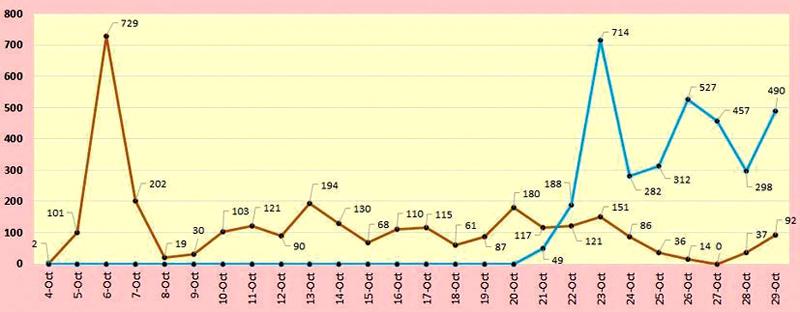
Sri Lanka is about to face a challenging situation with a sudden surge in demand for PCR tests and a shortage of Public Health Inspectors (PHIs), amid the much stronger second wave of the new coronavirus as emphasised by the health authorities, the Sunday Observer learnt last week.
The Government Medical Officers’ Association and the Association of Government Medical Laboratory Technologists said a dangerous situation has arisen, especially due to the delay in receiving PCR results.
Sri Lanka possesses 25 PCR test machines which can test 8,000 samples daily. However, the breakdown of a key PCR machine in the Mulleriyawa IDH premises, has hindered the detection of Covid-19 patients, Army Commander and Head of the National Operations Centre for Prevention of Covid-19 Outbreak (NOCPCO), Lieutenant General Shavendra Silva told the media last week.
This breakdown has resulted in the backlog of 20,000 PCR tests by Thursday (29), with a delay of about 5 days to release test results.
A recent meeting of the NOCPCO had paid close attention to the delay and President Gotabaya Rajapaksa has also been briefed on the issue, it was reported.
Malfunctioning
Asked about the progression of the fixing of the malfunctioning PCR machine, media spokesperson for the Health Ministry Dr Jayaruwan Bandara told the Sunday Observer, that the issue will be sorted in three days.
“We have already informed the manufacturer of the machine. They will fix the machine in three days as we were informed,” Dr Bandara said.
Government Medical Laboratory Technologists Association President Ravi Kumudesh said that the authorities should prioritise introducing the rapid antigen test facility rather than spending time and money on fixing the IDH PCR machine.
“All these PCR machines are subjected to daily maintenance. All these PCR machines except for the one in the IDH hospital has local agents. Therefore, we can fix any malfunction during any hour of the day as there are technicians in the country. But this machine has been imported from China without having a local agent,” he said.
However, Chinese experts to fix the malfunctioning PCR machine had arrived in the country yesterday, the Chinese Embassy in Colombo tweeted.
“We learn that technicians from the #PCRtest manu company have landed tonight (Friday night) at #Colombo via the nearest flight, upon the emergent request from #SriLankan. So far the malfunction reason not clear. Other machines will also be checked & maintained, after 24/7 running for months,” the tweet said.
IDH PCR laboratory was installed in May 2020, with monetary assistance from the Asian Development Bank (ADB).
The laboratory had cost Rs 250 million, the largest investment in Sri Lanka’s medical laboratory history, Kumudesh said.
“There was a fund from the World Bank to the tune of USD 180 million to update testing facilities. It is still on the table. Sri Lanka must apply for it and invest in the latest testing technologies,” he said.
PCR machines in the country, take 8 hours to provide a test result, while the latest technology delivers test results in an hour. Kumudesh said four PCR machines with the latest technology can produce 4,000 tests daily.
“We request President Gotabaya Rajapaksa to bring four latest PCR machines. We are ready to discuss the need for those machines with the President,” Kumudesh said.
Testing capacity
The Government Medical Officers Association also expressed their views upon increasing the testing capacity during a media briefing last week.
“We cannot move forward with a PCR capacity of 8,000. We must look into alternatives, such as Rapid Antigen test and antibody test. We should conduct random tests in the community to learn about the spread of the virus,” Dr Haritha Aluthge of GMOA told the media.
He said, “Only if we increase the testing capacity, we can control the situation. China is facing another wave of Covid-19, with a fresh cluster.
The first step of Chinese authorities was to conduct 4.7 million PCR tests to represent a majority of its population. We also have to continue such an ‘aggressive testing’ method”.
During a press briefing last week, Deputy Director General of Laboratory Services at the Ministry of Health Dr Ananda Jayalal told the media that steps will be taken to import antigen test kits.
“A PCR test requires 6 – 7 hours with expensive equipment and smooth technical gear and a team of doctors with a specialist.
But a Rapid Antigen Test does not require such a complicated procedure, and allows quick reports. That is why we need the Rapid Antigen Test soon,” he said.
It is also reported that President Gotabaya Rajapaksa has instructed officials to take immediate action to import antigen test kits to the country.
The shortage of Public Health Inspectors has become another challenge in the battle against new coronavirus.
As recorded, due to the scarcity of PHIs, the following up of primary and secondary contacts of Covid-19 patients has been problematic. PHIs Union President Upul Rohana was not available for comment.
